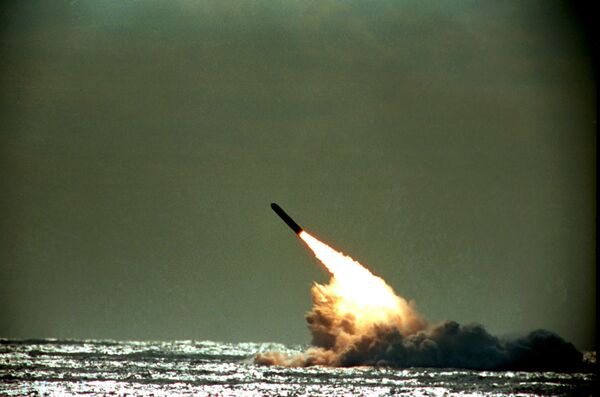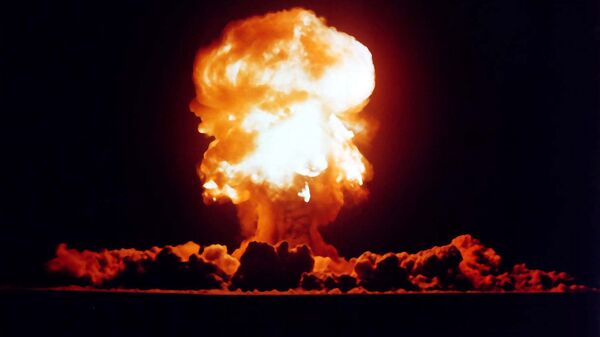Russian and US officials have embarked upon a third round of nuclear arms-control talks in the Austrian capital with the 2010 New Strategic Arms Treaty (New START) is set to expire in February 2021.
The meeting in Vienna is led by Russian Deputy Foreign Minister Sergei Ryabkov and US Special Presidential Envoy for Arms Control Marshall Billingslea.
#Russia-#US consultations on strategic stability in Vienna will start in a few minutes. Open- minded professional dialogue is better than propagandistic rhetoric which prevailed in this area for a long time. pic.twitter.com/rxxJNXWipv
— Mikhail Ulyanov (@Amb_Ulyanov) August 17, 2020
The two sides are locked in discussions over the fate of their last remaining nuclear arms-control agreement, which caps the number of nuclear warheads Russia and the US can deploy at 1,550. The agreement also places limitations on the use of intercontinental ballistic missiles (ICBMs) and ICBM launchers.
US President Donald Trump earlier indicated he would prefer a new deal to include other nations, mainly China, while Foreign Minister Sergey Lavrov has gone on the record as underscoring that Russia wants to extend the New START as soon as possible, but without preconditions.
No apparent breakthrough was visible after the previous rounds of talks in June, when Billingslea said the US was "leaving all options on the table" regarding the future of the treaty, including extending it.
Beijing was invited to the talks but did not send its delegation there.
Washington has been setting forth three key preconditions for a possible extension of the treaty.
Verification
Firstly, Ambassador Marshall S. Billingslea suggested US dissatisfaction with New START’s verification measures, without specifying any details, and against the backdrop of the State Department’s annual compliance report confirming that Russia was meeting the treaty’s terms. Nevertheless, verification measures were designated as the third condition for a New START extension.
More ‘Comprehensive’ Treaty
Washington’s second condition dealt with extending the negotiations to include nuclear arms not constrained by New START, especially Russia’s large number of non-strategic nuclear weapons.
The US insistence on introducing the newest Russian weapons systems into the talks is basically a matter of “knocking on an open door”, Russia’s Foreign Minister Sergey Lavrov said in July.

Earlier, in February, Lavrov emphasized that in previous contacts between the sides it was explained to the US that Russia would be willing to leave open the possibility that some of the newest rocket systems could be the subject of discussion, despite the fact that they are weapons outside the classic terms of START-3.
Bringing China to the Table
The president’s “arms control” envoy, Marshall Billingslea, told The Washington Times on 7 May that before there is talk about an extension of New START, Russia must “bring the Chinese to the negotiating table.”
Beijing has dismissed the overtures as long as Russian and US nuclear arsenals remain orders of magnitude larger than China’s.
While Washington has been urging Russia to sway the Chinese stance on the issue, Moscow has responded by saying it is up to Beijing to make that decision.
Foreign Minister Sergey Lavrov stated in February that Moscow “will not try to convince China” to join the talks.
China considers the United States' attempts to engage Beijing in trilateral US-China-Russia arms control talks as a ploy by Washington to overshadow its pursuit of nuclear hegemony, Chinese Ambassador to Russia Zhang Hanhui said.
"The US has repeatedly made proposals on arms control for China, Russia and the US and promoted the 'China factor' to distract international attention, pursuing to justify its withdrawal from the US-Russian New Strategic Arms Reduction Treaty [New START] and pursuing 'self-liberation' and achievement of absolute strategic advantage. China and Russia see this very clearly," Zhang said.
Be that as it may, the parties to the current talks might be construed as having geared up for a constructive dialogue, with Marshall Billingsley tweeting that one of the most representative US delegations, which included high-ranking military personnel, was dispatched to Vienna, intent on “serious dialogue”.
Negotiations about to start. The U.S. is prepared for a serious dialogue. pic.twitter.com/SEA1zbw1FZ
— Ambassador Marshall S. Billingslea (@USArmsControl) August 17, 2020
The level of Russian representation, according to Sergei Ryabkov, is appropriate, so there is a chance that START-3 is not entirely doomed.


